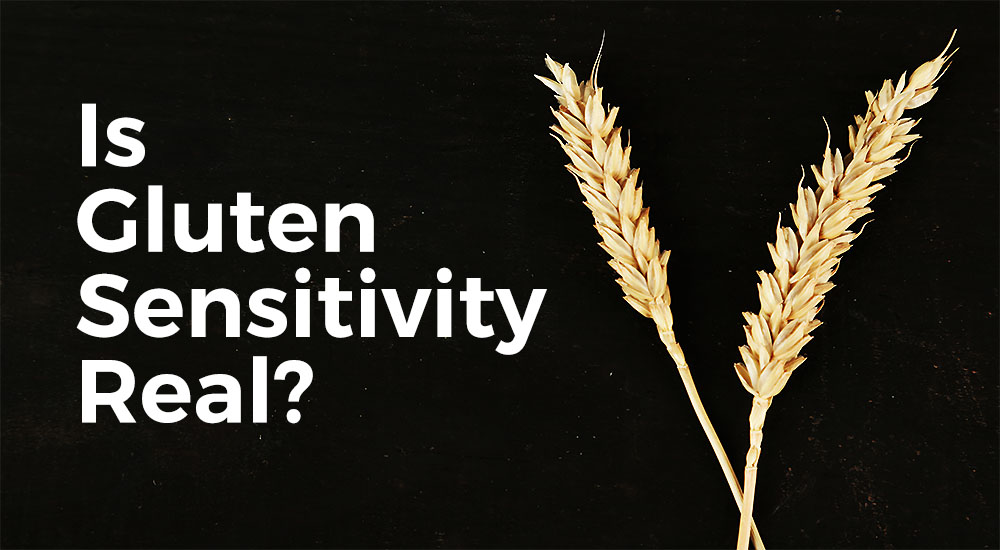Does Gluten Sensitivity Really Exist? Learn the Truth!

Does Gluten Sensitivity Really Exist? Learn the Truth!
If you follow a gluten-free diet or know someone who does, you likely heard all the “hoopla” a few months ago most of the media outlets picked up an article by a blogger who used a 2013 research study to claim that there was “no such thing as gluten sensitivity”.
I know that I personally was deluged by questions from patients at Root Cause Medical, and certain YouTube audiences took me to task for talking about gluten sensitivity when it was now “proven” not to exist.
I’ll be honest. I ignored the whole thing because I knew it wasn’t true. There is such a wealth of research and evidence to support the existence of gluten sensitivity, not to mention all my personal experience with my patients, that I didn’t feel the need to substantiate its existence.
Have Well-Meaning “Friends” Been Causing You to Question Your Gluten-Free Diet?
Time has passed and, frankly, with the upcoming holiday season when cheating tends to increase—and the presence of family members or “friends” who like to give gluten-free individuals a hard time about their choice to eschew gluten similarly increases, I decided that it was time to discuss the specifics behind this blogger’s claims. The last thing I want is for this partial information to destabilize a person who we know to be gluten sensitive. If such an individual starts to cheat with gluten because they begin to question whether their gluten sensitivity diagnosis is accurate or meaningful, they will be damaging their health to a dangerous degree.
The study the blogger promoted and that went positively “viral’ in the media was entitled “No Effects of Gluten in Patients With Self-Reported Non-Celiac Gluten Sensitivity After Dietary Reduction of Fermentable, Poorly Absorbed, Short-Chain Carbohydrates” – don’t worry we will define these terms in the next paragraph! It was a double-blind randomized placebo-controlled trial and the blogger made a big deal about that. There’s certainly much good to be said about such studies as they do tend to be the hallmark of well-executed research. What the blogger didn’t do however was READ the entire study. Instead, it seems that the title and perhaps the outline was as far as was gotten in doing due diligence.
What’s a FODMAP?
Of course, the title would lead one to believe the authors are stating they found people who themselves believe they have gluten sensitivity (GS) to not be affected when they consumed gluten, as long as they were restricting fermentable oligosaccharides, disaccharides, monosaccharides, and polyols (FODMAPs).
Before you go unconscious after that last sentence, let me define our terms:
Carbohydrates are sugar and starch molecules strung together. Going in order from largest to smallest, oligosaccharides are short-chain carbohydrates, while disaccharides are carbohydrates made up of a pair of sugar molecules and a monosaccharide is a carbohydrate made up of a single sugar molecule. Lastly, polyols are sugar alcohols such as xylitol, sorbitol, and maltitol. All but the oligosaccharides are considered sugars.
The fermentable description points out that these particular carbohydrates are not being properly broken down and digested by enzymes as should occur normally, but instead are acting as food for pathogenic (disease-causing) bacteria in the gut. If someone is sensitive to these foods and reacts in this fashion, they can expect to have digestive symptoms such as bloating, gas, pain, diarrhea, etc. Those not reacting negatively to these foods would gain a positive effect from their nutritional content plus any aspect not completely digested would act as prebiotics or food for the good bacteria of the gut. All good things.
Below is a partial list of FODMAP foods. These foods are typically found to be a problem only in some individuals suffering from IBS and other digestive issues. This is not a diet to be recommended lightly as there are many healthy fruits and vegetables included within the list of foods to be avoided. Here at Root Cause Medical, we use it occasionally on particular patients who seem to fall within this restricted category. Also keep in mind that, unlike with gluten sensitivity (where patients must consume zero gluten), FODMAPs have a dose-response relationship, meaning that eating less of these certain foods can help the condition.
Fruits
| Apples | Apricots | Avocados |
| Blackberries | Cherries | Plums |
| Pluots | Nectarines | Peaches |
| Pears | Persimmons | Grapes |
| Mango | Watermelon | Fruit Juice |
Vegetables
| Asparagus | Artichoke | Beets |
| Broccoli | Brussels Sprouts | Butternut Squash |
| Cabbage | Celery | Cauliflower |
| Eggplant | Fennel | Garlic |
| Leeks | Mushrooms | Okra |
| Onion | Shallots | Sweet Potatoes |
Dairy products – Some butter, cream, and hard cheese is allowed
Grains – Wheat, barley, and rye
Protein – All legumes such as kidney beans, soybeans. etc. A small number of chickpeas and lentils are allowed.
Nuts: Pistachios, cashews
As you can see, there are a great many foods that are considered FODMAPs, the majority of which do not contain gluten. So to assume that someone who eliminates gluten and feels better is really someone sensitive to FODMAPs really doesn’t take into account the true depth and breadth of the variety of foods that fall within this description.
What Was This Study Trying to Prove?
When reviewing a study it’s important to look at the purpose of it. What were the researchers trying to prove or disprove? In this particular study, the authors were looking specifically at patients with IBS and self-reported gluten sensitivity (also called non-celiac gluten sensitivity or NCGS) and wondering if ingesting gluten would really make a big difference in their symptoms or was it potentially more a problem with the digestion of FODMAPs, described above.
There are many points to be aware of when reviewing this study and knowing them will prove the recent media comments claiming the “nonexistence” of GS to be well off the mark.
(1) There were only 37 people who participated – certainly not a robust number.
(2) Participants were not formally diagnosed with GS. They were “self-reported” to have the condition. Not that there’s anything wrong with someone realizing for themselves that gluten bothers them, but there was no clinical testing involved with these participants. When you add into the equation that no human properly digests wheat, there could certainly be a number of people within this study that fell within the wheat sensitive category, while not necessarily suffering from GS.
(3) In the authors’ efforts to eliminate anyone with celiac disease (CD) they chose to eliminate from the study anyone with the HLA-DQ2 or DQ8 genes. These genes are associated with celiac disease, true, but 30-40% of gluten sensitivity sufferers also have these genes. Therefore in eliminating people with this genetic profile, they could have easily eliminated the very individuals they were trying to evaluate, those with GS.
(4) The authors discounted some individuals who reacted to the placebo when the placebo in this study was whey protein. Certainly not placebo-worthy in my book. A vast majority of the population, and certainly many people sensitive to gluten, react negatively to dairy. Almost 20% of the participants fell within this category. “Reacting” to the placebo excluded any other negative response the individual had because it was thought that their reaction wasn’t valid since they also reacted to the placebo. We know better when it comes to dairy products – they are anything but a “neutral” food.
(5) Sixteen percent of the participants reacted to the high gluten diet, but that number was cut in half upon reporting the study results because half of them had the gene as mentioned above in point #3. Therefore it was stated that only 8% of the patients had a reaction and the conclusion was then made that eating gluten didn’t seem to both a significant number of these individuals – not accurate.
(6) The authors, in their effort to focus on IBS, only evaluated digestive symptoms (abdominal pain, bloating, stool consistency, gas) along with fatigue when deciding if a participant “reacted” to the gluten they were exposed to. It is well known that gluten sensitivity more frequently results in neurological problems, but no symptoms beyond those mentioned above were evaluated when these individuals were fed gluten. Additionally, other common symptoms, beyond those of the nervous system, known to be caused by gluten sensitivity such as joint pain and skin issues, too were not evaluated. In other words, a participant could have ingested gluten and gotten a headache, brain fog, or felt depressed, but those symptoms were not included in the study as a “reaction”. Are you starting to see the problem? The authors realized this oversight as well. In fact, they mention it in the discussion part of the study. Apparently the reporting blogger and other media outlets who claimed the study “proved” that gluten sensitivity doesn’t exist never got that far when reporting the facts of the study.
(7) The authors further noted in the “discussion” part of the study that those sensitive to FODMAPs are triggered to have digestive symptoms, while those sensitive to gluten can be triggered to have an overall lack of wellness. This is clear evidence that the researchers had no intention of negating that gluten sensitivity exists.
(8) The authors do state that gluten “might not be” a specific trigger of functional gut symptoms once FODMAPs are removed from the diet, but that isn’t stating that gluten sensitivity doesn’t exist. It’s simply emphasizing one point we always talk about with the secondary effects of gluten. And that is that someone with a truly healthy gut (truly healthy!) would potentially have a strong enough immune system to not demonstrably react to gluten. The problem is finding a truly healthy gut in today’s society. Not an easy proposition, I assure you. And, of course, I’m not stating that an issue with FODMAPs doesn’t exist, it does. But I am trying to clarify what these authors were trying to prove and it wasn’t the non-existence of GS.
(9) Last but not least, it’s very important to know that these same authors published an earlier study entitled “Gluten causes gastrointestinal symptoms in subjects without celiac disease”. Their intention with that study was to prove that there WAS such a thing as gluten sensitivity and prove it they did.
The Truth? Gluten Sensitivity Does Exist!
Do you feel a bit better about this now? I hope so. I’m sure these researchers who themselves know of the existence of gluten sensitivity, having successfully proven it to themselves in 2011, were a bit surprised to find their study in the maelstrom of controversy that ensued after a non-medical blogger took off with erroneous conclusions and got a tremendous amount of press as a result.
So, if you find yourself being assaulted by someone who thinks they “know” that gluten sensitivity has been disproven as a condition, you now have the ammunition you need to prove to them that it “just ain’t so”!
Seriously though, don’t let the media dissuade you from what you already know or strongly suspect. Years and years of research are rarely thrown out the window with one study. And remember, this study didn’t even set out to prove what others are claiming of it. Sadly, it was really just a misunderstanding.
Do you need help with your health?
We have the diagnostic and testing tools, the clinical experience, and a different medical approach to discovering the root cause of why you have the symptoms that are bothering you. As long as you are ready to make some dietary and lifestyle changes, we can help you. We will "hold your hand" through the changes, step by step, to make each step an easy one. We are located in Clearwater, FL, at 1000 S Ft Harrison, at the corner of Ft. Harrison Ave. and Magnolia St. There is plenty of parking space directly accessible from Ft Harrison. If it is not convenient for you to come to Root Cause Medical Clinic, we offer telehealth/telemedicine consultations to residents of certain states. Call us for details.
Contact us for a Consultation – Call 727-335-0400

Dr. Vikki Petersen DC. CCN
Founder of Root Cause Medical Clinic
Certified Functional Medicine Practitioner
Dr Vikki Petersen is a public speaker, author of two books, several eBooks and creates cutting edge content for her YouTube community. Dr Vikki is committed to bringing Root Cause Medicine and its unique approach to restoring health naturally to the world.
Ask a Doctor
Have a health concern you'd like to speak with a doctor about? Or just want clarity on a subject? Ask Us!
Featured Articles
Popular Stories
References:
1. Gastroenterology Volume 145, Issue 2, Pages 320–328.e3, August 2013, Jessica R. Biesiekierski
No Effects of Gluten in Patients With Self-Reported Non-Celiac Gluten Sensitivity After Dietary Reduction of Fermentable, Poorly Absorbed, Short-Chain Carbohydrates
2. American Journal of Gastroenterology 2011; 106:508-514, Jessica R. Biesiekierski
Gluten Causes Gastrointestinal symptoms in subjects without Celiac Disease


